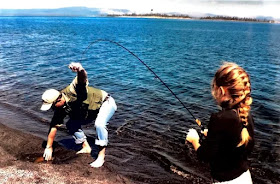When I read “To Kill A Mockingbird” for the first time — and every time since — I invariably pictured my father as Atticus Finch. It didn’t hurt that he’s a lawyer and looks like Gregory Peck, with glasses, determined features, and dark hair falling over his forehead. But the resemblance was deeper.
After I read of how Atticus gently sat Scout down on the porch swing and explained our imperfect world to her childish ears, I thought of each time my dad would do the same when I discovered some new hurt or crisis. His explanations of the deep obligations of integrity sounded like the heartfelt lessons in which my dad explained to me the importance of doing what’s right.
Like my dad, Atticus was enduringly wise and capable of solving anything. He carried the weight of the world on his shoulders, in the selfless hope of making it better for his children.
It’s easy to idolize your parents as a child, and of course no one is flawless. But as an adult, I continue to look up to my dad greatly. He taught me about the world, and about the integrity and sacrifice necessary to live well in it. In doing so, he also taught me, his daughter, a great deal about manhood.
It’s been observed plenty that the American leftist cultural narrative doesn’t teach boys what they should be learning about manhood. It goes without saying that teaching boys how to be good men is an indispensable part of a flourishing society.
But the public sphere’s masculinity vacuum hurts girls too. Women have no shortage of interactions with men — we marry them, work with them, go to church with them, grow up with them, and raise them. We have a cultural imperative to teach boys how to be men, but we have just as much need to teach girls what masculinity looks like, and to expect it from the men in their lives.
My dad taught me to respect and expect integrity, sacrifice, and wisdom from men. A man worth his salt doesn’t let fear or pressure intimidate him out of doing the right thing, condemning evil, or standing up for those who can’t defend themselves.
Through his example of going to a taxing and wearisome job every day, then coming home to help my mom with dinner, fix a broken sink, or work in the yard, my dad showed me good men make sacrifices. Women aren’t exempt from the obligation to live sacrificially too, of course. But what separates men from boys (and women from girls) is an eager and persistent decision to place others’ needs above their own. To listen patiently even after a long day, to place duty above pleasure, and to do so out of love.
As he’s made those sacrifices, my dad has also shown me how much a man should value his family. He and my mom have cultivated our family as a great source and depository for each other’s encouragement, support, fun, and rest.
I’ve also learned from watching him that manhood includes a strong sense of duty. In high school, my favorite thing to watch with Dad was HBO’s “Band of Brothers,” and each episode prompted deep discussions about duty and leadership. Out of a sense of sacred obligation to God, loved ones, and country flow daily sacrifices and the motivation to continue them. Inseparable from that duty, too, is a strong sense of loyalty toward those to whom love obligates you.
Dad also instilled in me that men should be — and women should appreciate them being — capable. From knowing political and historical details to being able to change a tire or fix things around the house with his hands, I could always trust his expertise. When I was little, he was the one who could make my skinned knees magically better through a sly or funny change of subject I didn’t even realize had happened.
Not all men have to be history buffs or amateur carpenters, of course, but there is something deeply admirable about being a capable and knowledgeable problem-solver. For all of the elite sneers about “mansplaining,” capability is a quality we should be careful not to devalue.
So is wisdom. Problem-solving isn’t limited to fixing appliances. It also includes thoughtful insight and discerning counsel. As a woman, there are few virtues I’ve learned to admire more in men than good judgment and its wise application.
I also learned from my dad to expect, but also earn, respect. He took me on daddy-daughter dates and always opened the door for me. I remember him making a special point to dance with me at my cousin’s wedding when I was little. From preschool to my professional life, he has always celebrated my victories but never let me be complacent with success or gave empty praise.
There’s plenty more to admire about my dad, like the matchless sense of style he’s sported since the 1980s. But as he’s helped teach me to be a principled and well-rounded person — and thus a better woman — he’s also shown me what strong masculinity looks like. His example has equipped me to expect and celebrate genuine masculinity in my own friendships and interactions. And more than anything, it prompts me to be grateful for such an exemplar — this Father’s Day and every day.

